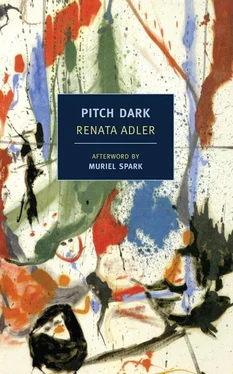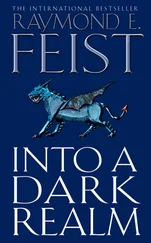Renata Adler - Pitch Dark
Здесь есть возможность читать онлайн «Renata Adler - Pitch Dark» весь текст электронной книги совершенно бесплатно (целиком полную версию без сокращений). В некоторых случаях можно слушать аудио, скачать через торрент в формате fb2 и присутствует краткое содержание. Год выпуска: 2013, Издательство: NYRB Classics, Жанр: Современная проза, на английском языке. Описание произведения, (предисловие) а так же отзывы посетителей доступны на портале библиотеки ЛибКат.
- Название:Pitch Dark
- Автор:
- Издательство:NYRB Classics
- Жанр:
- Год:2013
- ISBN:нет данных
- Рейтинг книги:3 / 5. Голосов: 1
-
Избранное:Добавить в избранное
- Отзывы:
-
Ваша оценка:
- 60
- 1
- 2
- 3
- 4
- 5
Pitch Dark: краткое содержание, описание и аннотация
Предлагаем к чтению аннотацию, описание, краткое содержание или предисловие (зависит от того, что написал сам автор книги «Pitch Dark»). Если вы не нашли необходимую информацию о книге — напишите в комментариях, мы постараемся отыскать её.
Pitch Dark Composed in the style of Renata Adler’s celebrated novel
and displaying her keen journalist’s eye and mastery of language, both simple and sublime,
is a bold and astonishing work of art.
Pitch Dark — читать онлайн бесплатно полную книгу (весь текст) целиком
Ниже представлен текст книги, разбитый по страницам. Система сохранения места последней прочитанной страницы, позволяет с удобством читать онлайн бесплатно книгу «Pitch Dark», без необходимости каждый раз заново искать на чём Вы остановились. Поставьте закладку, и сможете в любой момент перейти на страницу, на которой закончили чтение.
Интервал:
Закладка:
What’s new? the biography of the opera star says she used to ask in every phone call, and What else? I’m not sure the biographer understood another thing about the opera star, but I do believe that What’s new. What else. They may be the first questions of the story, of the morning, of consciousness. What’s new. What else. What next. What’s happened here, says the inspector, or the family man looking at the rubble of his house. What’s it to you, says the street tough or the bystander. What’s it worth to you, says the paid informer or the extortionist. What is it now, says the executive or the husband, disturbed by the fifteenth knock at the door, or phone call, or sigh in the small hours of the night. What does it mean, says the cryptographer. What does it all mean, says the student or the philosopher on his barstool. What do I care. What’s the use. What’s the matter. Where’s the action. What kind of fun is that. Let me say that everyone’s story in the end is the old whore’s, or the Ancient Mariner’s: I was not always as you see me now. And the sentient man, the sentient person says in his heart, from time to time, What have I done.
Was it in the contemplation of my ancestors that I should share a guest room, one long weekend, with Mausi Esterhazi? Was it in the contemplation of Mausi’s ancestors. Was it in the contemplation of my ancestors that the sushi chef should say to me, with concern, at summer’s end, You are lose weight? Or that one curator should say to another, in my presence, of a third, He is married, which is very important in Chicago?
You spend too much time alone, says a murmur from the anti-claque; you are like some wet, tousled, obsessed rat or mouse, in a concrete bunker, all the time alone. But also, you spend too much time with friends. Here we have the water colors, here we have the bas reliefs. And these are the oils. This is the sculpture garden. We also have mobiles, in color, that can both make sounds and move. And here, he said, we have the rubble that resulted when the breakthrough came. You remember everything, he said, you remember everything, out of context, and then you brood. Look, you can’t write on a trapeze, and this is not a metronome. Yes, it is. I live with an hysteric and a metronome. I live with a person in despair. I live on a trapeze in a jungle where there is a harpsichord. I’m a pretty persuasive advocate when the cause is just.
When I have dressed and gone downstairs, I find a small pitcher of milk in the refrigerator; on a shelf, nearby, an open jar of instant coffee, two-thirds empty, with a spoon still in it, clearly Celia’s. Everything else is clean, tidy, spankingly empty. In a small, damp pantry, not the one with the wall safe, I find a trash can, full of coffee grounds and egg shells. For the compost heap, I think. No eggs. On the counter, some stale bread. Though the kitchen is very well equipped, with pots, pans, stoves, refrigerators, small devices, even, come to think of it, elaborate hi-fi radio (Celia, I now recall, had, from the moment I met her, been playing loud, incongruous rock), I cannot, for some reason, find the toaster. I know there must be one. I try the oven. After several minutes of looking in vain for the pilot light, with matches, I give up. Fearing an explosion, I turn the oven off, and consider giving a toaster as a house present. I make coffee, with hot water from the tap and cold milk from the pitcher. I decide to try to use the telephone. Having turned the crank, and figured out the switches, I reach an operator, to whom I explain that, once my call has gone through to New York, he must under no circumstances interrupt the call, because to do so would be to disrupt, perhaps permanently, but at the very least for half an hour, my answering machine. Oh, he says, I would never interrupt; I only connect you with the international operator. Then, bypassing the international operator, he puts the call straight through, and abruptly cuts it off. When I try again, having waited the required half hour, I reach the international operator. In response to my explanation, she says, becoming very obdurate on this point, I would never cut into a line, certainly, never. As soon as the call goes through, she breaks in, to say, Go ahead please, your party is on the line. When another half hour has elapsed, I reach her again. I start to say, But this time, operator, please. And she says, with that edge of injury and contempt I am beginning to become accustomed to in all their voices: It was only a recording. The call goes through. No message there.
She was Goldilocks, really, with this exception: when the third bear left, he had taken with him his porridge, and his chair. And the bed? Well, the bed was there, and the prince came and he kissed her. Hey, wait. Look here, this is Medea. This is Eloise at the Plaza. This is Agatha Runcible. Here I am, for the first time, and yet again, alone at last on Orcas Island. You were, you know, you are the nearest thing to a real story to happen in my life, and you are gone.
I go into the study, light a peat fire, watch the dawn through the soft rain. From the bookshelves, I take down Samuel Pepys, abridged; I have somehow never read him. I put paper in the typewriter, and begin a friendly note to the ambassador. Shortly after ten, the front door opens. I hear voices in the kitchen. I find Celia, Kathleen, that overfed, moon-faced baby, all three eating fried eggs and ham. I mention that I have had coffee with milk. Was there enough for you? Celia says, perhaps with irony, certainly not in the slightest friendly. Or what would you like for breakfast now. I say I’d like a five-minute egg. And, when Kathleen brings it to me, at my place in the dining room, the egg really is five minutes. Celia had not mentioned toast, nor had I, so I’m startled when, as I eat in silence, toast pops up out of a toaster, which I had simply not noticed on the sideboard. I get up, take the toast and a banana. When I have finished eating, I return to the study. As I begin to type, Kathleen appears, says, Will you be wanting me for your phone calls? I say, Thank you, I think I can manage. About an hour later, a stocky man, in a woolen cap and jacket, comes in, says, How do you do, I’m Paddy. Is there anything I can do for you this morning? He seems marginally more friendly than the others. At the same time, something covertly appraisive in his manner, an almost lascivious shrewdness, makes me think, Is it just that they think I’m the ambassador’s mistress, and that there is something not quite proper in the arrangement; is it my clothes, the faded corduroy slacks, the tennis shoes, my down jacket; or, perhaps outdoors, the damaged fender? But I say, Well, yes, Paddy, could you tell me the best place to go for a walk. How long a walk were you thinking of? he says. I say, About an hour, and add that I don’t have much sense of direction. In some detail, then, he describes a walk. I ask where I would go if I wanted a two-hour walk. In reply, he describes what I realize is the exact same walk. While it’s true I’ve said that I can get lost virtually anywhere, on account of that sense of direction, it seems odd to me, not sinister but odd, that the one-hour walk and the two-hour walk should be the same. As I pass the kitchen, on my way to the front door, Celia asks what I would like for lunch. Remembering the ambassador’s words, I ask whether I might have a picnic. Celia, brightening, says, Now? I look at my watch. It is quarter past eleven. I say, No thank you, when I come back from this walk, I’ll just take another walk and have my picnic then. I set out down the driveway, toward a path along the sea verge and the rocks. When the path turns inland, uphill, the wind subsides, the rain slows to a fine mist, and I see, coming toward me, a small man of middle years, with one of the sad, poetic faces — wisdom there, humor and beauty. From some distance off, he says, Good morning, in such a friendly voice. I reply, Good morning. And, not wanting to lose contact, I go on, Nice day. A bit showery, he says, as he steps aside to let me pass. We continue on our separate ways.
Читать дальшеИнтервал:
Закладка:
Похожие книги на «Pitch Dark»
Представляем Вашему вниманию похожие книги на «Pitch Dark» списком для выбора. Мы отобрали схожую по названию и смыслу литературу в надежде предоставить читателям больше вариантов отыскать новые, интересные, ещё непрочитанные произведения.
Обсуждение, отзывы о книге «Pitch Dark» и просто собственные мнения читателей. Оставьте ваши комментарии, напишите, что Вы думаете о произведении, его смысле или главных героях. Укажите что конкретно понравилось, а что нет, и почему Вы так считаете.












